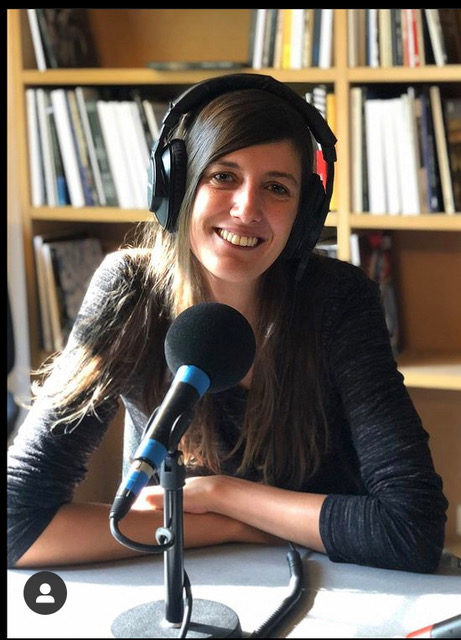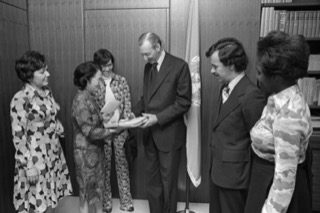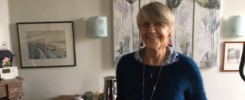
Myriam Piguet is a PhD student and teaching assistant at the Global Studies Institute, affiliated with the Department of History since September 2018. She holds a Master’s degree in “International and Global History” from the University of Aarhus (Denmark) and a Bachelor’s degree in History from the Free University of Brussels.
She is currently preparing a PhD thesis exploring women’s careers in the Secretariats General of the League of Nations and the United Nations under the supervision of Sandrine Kott (UNIGE) and Monika Baar (Univ. Leiden). She was involved in the project 100Elles* in Geneva, which aimed at proposing alternative street names for a better gender balance.
Myriam brings us inspiring insights from her open mind enriched by travelling back in history as well as around the world. Get inspired too and share her story around!
Can you describe your path to becoming a scientist? What and / or who helped you in your professional choices?
I am 28 years old. I am still a scientist in training, not yet a doctor. I am currently working on my PhD research. I grew up in Geneva and I studied in this city until the end of high school. I never thought that I would end up doing what I do today.
After high school, I was au-pair in Australia. When I came back to Europe, registrations were closed in all Universities, except for Belgium. Out of nowhere, I chose to settle in Brussels and study History. I ended up really liking this field to the point that after my Bachelor, I decided to start a Master’s degree in historical research in Denmark, taught in English.
At Aarhus University, I met Professor Karen Gram-Skjoldager, who was working on a research project about the history of international bureaucracy seen through the lenses of the League of Nations. As I was from Geneva, this was an unexpected match! I came back to my hometown and she became the supervisor of my Master’s thesis. My topic was: women in the Secretariat of the League of Nations. In exchange, I was also consulting the archives at the Palais des Nations for her project and working a little bit with the team, taking part as a student. She was very kind to me, and I was able to publish my first article thanks to this research project. This experience was a tremendous opportunity for me!
So you have been educated mostly by women?
I really appreciate that during my studies, all my mentors were women.
During my Bachelor’s studies, I admired especially Professor Valerie Piette, who is specialized in Gender and African History. She taught in multiple classes and was the supervisor for my Bachelor thesis.
Now, I’m working with Professor Sandrine Kott, who teaches at the University of Geneva and New-York University. I have met her through my application for the PhD and she has been of great advice ever since. So yes, my academic path has been enhanced by women mentors.
After my Master’s studies, I had the idea of applying for a PhD, but it was complicated to envision doing it in Denmark because of the language, which is very challenging.
I therefore applied to other places and one position opened up here in Geneva. I applied for it and it worked. By then, I didn’t know Sandrine Kott, now my supervisor. I started the PhD with her, and I extended my research to the United Nations Secretariat.
I am looking at the two institutions in continuity, starting in the 1920’s until the UN decade for women, from 1975 to 1985. I’m questioning how women integrated into the field of international civil service.
The League of Nations was the first international organization in diplomacy to officially allow women to work under the same conditions as men. It is written in the Covenant of the League of Nations, Article 7. This addition to the Covenant came from the engagement of international women’s associations that were quite powerful at the time – much more than we generally imagine. Of course, at that time, these organizations mainly represented Western countries and a very specific category of women, bourgeois and well-educated.
They fought to allow women to be employed in the Secretariat of the League and to be national delegates in its Committees. And this is how it all started, actually. At the time, you could not officially enter French diplomacy, Swiss diplomacy or British diplomacy as a woman. They were real pioneers.
How does your research field contribute to society?
I believe that these women who worked in the League of Nations and in the United Nations should be recognized. We often forget that one of the big contributions of these international organizations is linked to social welfare and development. You find a lot of women who were working in this field in these two organizations from the 1920s onwards.
It is very important that we uncover their names. It is a good start. It is also important to question how the role of these women were played down by the institutions and by the leading historical narrative which, until recently, has favored men’s point of view.
My research is inspired by social sciences concepts such as the rhetoric of complementarity.
This concept illustrates the belief that women have a special role to bring to organizations, linked to their gender and complementary to the one of men. In international organizations, we observe a gendered division of work, as women are often confined to topics relating to welfare, communication or administration. Still, looking at the numbers, women represent half of the workforce in these Secretariats. However, most of them were ranked in low administrative positions, such as secretaries and hand-typing jobs.

Of course, this evolved over time. Hopefully, today, we are not considering that there is a specific professional role for each gender, and we look at it less and less when we hire a woman. Still, it is a lasting belief in international organizations and beyond. At the UN, we are still waiting for a women to be named Secretary-General.
That being said, I believe my research is not only about the matter of gender and women, it is also about studying the functioning of these two organizations. The League and the UN had a significant role in the codification of international order. For a long time, the historical discourse identified the League of Nations as a first attempt, and the United Nations as a sort of new departure. Today, many historians are demonstrating the continuity between the two organizations. Actually, the way they work and the way they are organized are pretty similar. By studying the employment of women, I am showing one side of this continuity.
Some of these women were employed in both organizations, or were in contact with each other, or they used the same kind of strategies. Moreover, there are differences between what you find in the discourse of the two organizations with regards to increase the participation of women, and the reality that you will find internally.
How do you convince investors?
Currently, I am employed as a teaching assistant in the Bachelor or International Relations at the University of Geneva. I was granted a Fulbright a year ago. I was meant to go to the U.S. to consult the UN archives in New York, but the Covid-19 pandemic has postponed this project.
It might happen. Well, I strongly hope it will happen in the near future … I therefore had to convince the Fulbright of the impact of my research to be granted this help. I don’t think that research should be covered by a scholar’s own funding.
Too often, PhD student still have to rely on their own economies to complete their research.
I am lucky, because I look at institutional archives, they are in great conditions. Many of my colleagues currently face greater difficulties. Still, the UN in New York is far and I need financial help to complete this research. I am also looking at some archives in the UK from international women associations.
Is there a big difference between financing research in your domain compared to other domains?
Currently, it is difficult to find financial funding in social sciences, notably in Switzerland and especially for early career scholars. It could end up being quite difficult in my field. As a young researcher, I am sometimes worried that I chose gender studies, especially as it is not developed in French speaking countries as much as it should be.
What, in your view, is the role of public relations in supporting science and how do you use them in your own strategy?
I think PR are very important! I have been working as a journalist before starting my PhD. I know how much public relations can be difficult for scientists. I enjoy doing it. It is of huge importance that we, scholars, put a lot of our energy into sharing our knowledge.
If I look at my research topic, you can easily relate it to the public. It is simple. People are interested about it and understand the concepts.
PR should not abandon topics that seem, at first glance, less interesting or too complex. We should work on making them more intelligible to the general public so that people can take part in the projects.
I was involved on the project 100Elles* to propose alternative street names in Geneva. We were many women taking part in this project: activists, historians, civil servants. We wrote the biographies of 100 women that are important for the history of the city. This is a great example of public history. We raised an issue. The city, the associations and academia worked together on a concrete project. It translates historical knowledge to the general public. Now people can have a better idea of the women that had an impact on Geneva’s history. More actions like this should happen. Yet, to achieve this, scholars need to be provided with funding and time.
Do you observe major differences on how science is supported in Switzerland or elsewhere?
My University in Belgium promoted social science and progressivism. Additionally, I was provided with good training regarding archives. I was given access to them very early on in my education, which is not always the case.
Then, in Denmark, the University was a good example of a public institution that functions very efficiently. Professors have the time to take care of their students. You strongly feel the heritage of the Scandinavian’s welfare-state. Everything there is being done to create a place where good education can happen.
Honestly, I think that in many places in Europe, professors don’t have as much time as they would need for teaching. Furthermore, Aarhus university was putting a lot of energy into bringing international students. Unfortunately, the general political mindset has changed, and many English taught masters have since switched to Danish.
Anecdote
There is an anecdote which I find quite indicative of the Scandinavian way in education. When I wrote my first essay at AU, my professor gave me a zero. You can get zero very easily in Denmark. And believe me I was not used to it! I asked my professor: why did I fail? He told me that my archival research was interesting but that, at some point, I should develop an individual point of view and should therefore redo the essay. In French-speaking countries, we don’t focus this way on independent thinking. On the other hand, here in Switzerland, I enjoy the opportunity of working in an interdisciplinary manner. At the GSI, I have the opportunity to share ideas with PhD students specialized in political sciences or economics.
Should you encourage young girls to get into science, what would you say?
At least with the project 100Elles*, I believe that some young women, teenagers, can now look at the street names and want to learn more about these women who can serve as role models. However, It is also important to question this idea of role models.
If it is not about princesses, it should neither be solely about women that went to universities. It is also about artists, blue collars, activists – we need to create a diversity of stories. As an historian, I really hope that more women, and other minorities will embrace the field and bring different ideas and research topics, different points of view – which will benefit the whole field.
In the History Department, if you look at PhD candidates, there is a majority of women. It is encouraging.
Is there something you would do differently or advise young scientists to avoid doing?
Hopefully not. No, not yet. I am happy that I travelled, and I would really encourage any student to do the same. We should not limit ourselves to the UK and the US and their reputation. There, education is often very expensive whereas there are many European countries where you can discover other cultures and other ways of doing research.
And do you have an anecdote to share about you as a woman?
I would like to pick an anecdote from one of the actors of my research. As I always have my nose to the grindstone, they are very inspiring for me! They were, however, not perfect, but this is what makes them all appealing. They have lots of defaults, and not all of them were feminists.
One of them was called Margaret Anstee. She was one of the first two women to reach the grade of Undersecretary General at the United Nations, in 1987. She wrote her autobiography at the beginning of the 2000’s, which she titled: Never Learn to Type – a woman at the United Nations.
She said:
The title than now adorns this book is a dictum that I invented for myself and have also stuck to throughout my career. (…) Many of my peers had to take secretarial courses and became high-powered assistants to men often not as bright or as qualified as themselves. I decided very early on that I would never learn to type, in order to avoid a similar fate.
Margaret Anstee
I am thinking about this title all the time. She really made a bold move choosing this name for her book.


